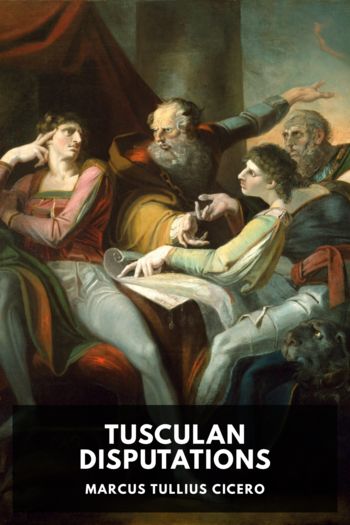Tusculan Disputations, Cicero [good book recommendations TXT] 📗

- Author: Cicero
Book online «Tusculan Disputations, Cicero [good book recommendations TXT] 📗». Author Cicero
Go, stranger, tell the Spartans, here we lie,
Who to support their laws durst boldly die.24
What was it that Leonidas, their general, said to them? “March on with courage, my Lacedaemonians. Tonight, perhaps, we shall sup in the regions below.” This was a brave nation while the laws of Lycurgus were in force. One of them, when a Persian had said to him in conversation, “We shall hide the sun from your sight by the number of our arrows and darts,” replied, “We shall fight, then in the shade.” Do I talk of their men? How great was that Lacedaemonian woman, who had sent her son to battle, and when she heard that he was slain, said, “I bore him for that purpose, that you might have a man who durst die for his country!” However, it is a matter of notoriety that the Spartans were bold and hardy, for the discipline of a republic has great influence.
What, then, have we not reason to admire Theodorus the Cyrenean, a philosopher of no small distinction, who, when Lysimachus threatened to crucify him, bade him keep those menaces for his courtiers? “To Theodorus it makes no difference whether he rot in the air or underground.” By which saying of the philosopher I am reminded to say something of the custom of funerals and sepulture, and of funeral ceremonies, which is, indeed, not a difficult subject, especially if we recollect what has been before said about insensibility. The opinion of Socrates respecting this matter is clearly stated in the book which treats of his death, of which we have already said so much: for when he had discussed the immortality of the soul, and when the time of his dying was approaching rapidly, being asked by Criton how he would be buried, “I have taken a great deal of pains,” says he, “my friends, to no purpose, for I have not convinced our Criton that I shall fly from hence, and leave no part of me behind. Notwithstanding, Criton, if you can overtake me, wheresoever you get hold of me, bury me as you please. But believe me, none of you will be able to catch me when I have flown away from hence.” That was excellently said, inasmuch as he allows his friend to do as he pleased, and yet shows his indifference about anything of this kind. Diogenes was rougher, though of the same opinion, but in his character of a Cynic he expressed himself in a somewhat harsher manner: he ordered himself to be thrown anywhere without being buried. And when his friends replied, “What? to the birds and beasts?” “By no means,” says he; “place my staff near me, that I may drive them away.” “How can you do that,” they answer, “for you will not perceive them?” “How am I then injured by being torn by those animals, if I have no sensation?” Anaxagoras, when he was at the point of death at Lampsacus, and was asked by his friends, whether, if anything should happen to him, he would not choose to be carried to Clazomenae, his country, made this excellent answer, “There is,” says he, “no occasion for that, for all places are at an equal distance from the infernal regions.” There is one thing to be observed with respect to the whole subject of burial, that it relates to the body, whether the soul live or die. Now, with regard to the body it is clear that, whether the soul live or die, that has no sensation.
But all things are full of errors. Achilles drags Hector, tied to his chariot. He thinks, I suppose, he tears his flesh, and that Hector feels the pain of it; therefore he avenges himself on him, as he imagines. But Hecuba bewails this as a sore misfortune:
I saw (a dreadful sight) great Hector slain,
Dragg’d at Achilles’ car along the plain.
What Hector? or how long will he be Hector? Accius is better in this, and Achilles, too, is sometimes reasonable:
I Hector’s body to his sire convey’d,
Hector I sent to the infernal shade.
It was not Hector that you dragged along, but a body that had been Hector’s. Here another starts from underground, and will not suffer his mother to sleep:
To thee I call, my once-loved parent, hear,
Nor longer with thy sleep relieve thy care;
Thine eye which pities not is closed—arise;
Ling’ring I wait the unpaid obsequies.
When these verses are sung with a slow and melancholy tune, so as to affect the whole theatre with sadness, one can scarce help thinking those unhappy that are unburied:
Ere the devouring dogs and hungry vultures …
He is afraid he shall not have the use of his limbs so well if they are torn to pieces, but is under no such apprehensions if they are burned:
Nor leave my naked bones, my poor remains,
To shameful violence and bloody stains.
I do not understand what he could fear who could pour forth such excellent verses to the sound of the flute. We must, therefore, adhere to this: that nothing is to be regarded after we are dead, though many people revenge themselves on their dead enemies. Thyestes pours forth several curses in some good lines of Ennius, praying, first of all, that Atreus may perish by a shipwreck, which is certainly





Comments (0)